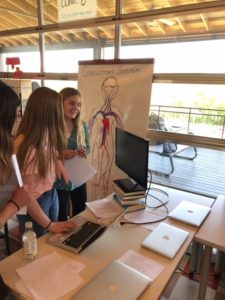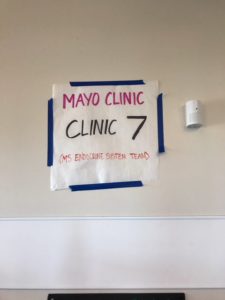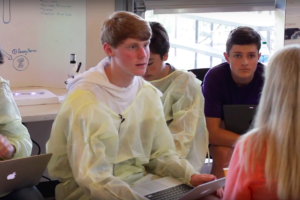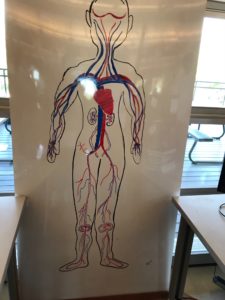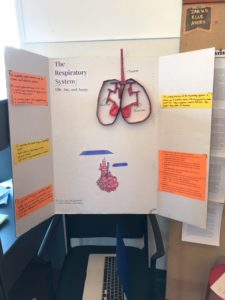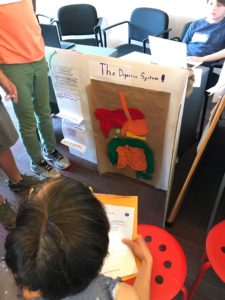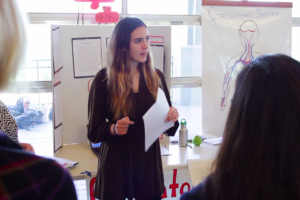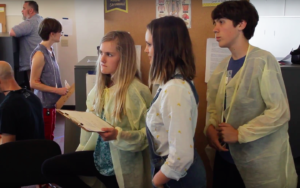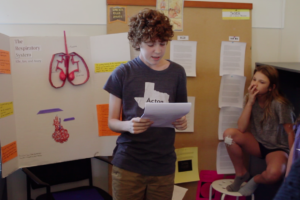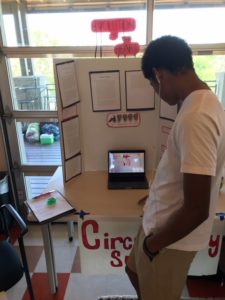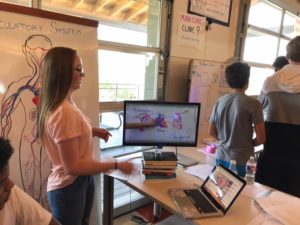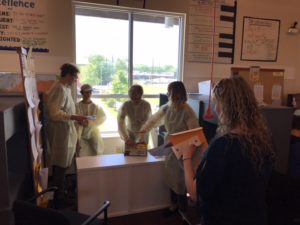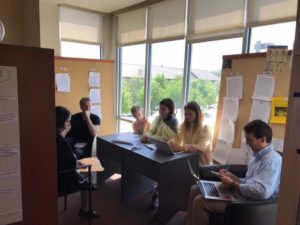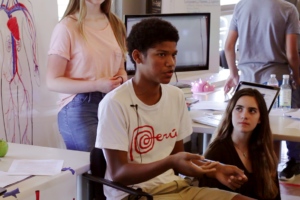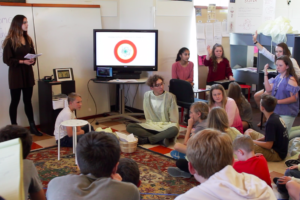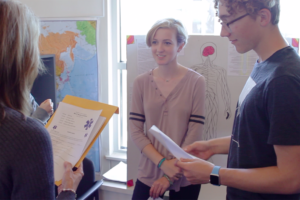Dr. Gregory House lorded over the fictional Princeton Plainview Hospital as a Sherlock Holmes-like diagnostic genius on the television show House M.D. Time after time, House would find just the right clue to solve the case; except when he failed and the patient died!
For the last five weeks our Middle School Eagles have stood in the shoes of Dr. House, diving deeply into subtleties of diagnostic medicine, building models of the various systems of the body (Respiratory; Circulatory; Digestive; Nervous; Endocrine; Skeletal-Muscular and more); while at the same time devouring the latest medical research on a disease of their choosing.
On Friday it was time for the Medical Quest Exhibition, where parents, new Acton Academy owners from around the world and other invited guests became patients in a three-act play addressing: “Who is the ultimate authority of a Hero’s health: you or your doctor?”
Act I: Research Funding Pitches: Each Eagle became a leading medical researcher pitching for funding, describing the latest scientific breakthroughs in a devastating disease like Alzheimer’s or Parkinson’s.
Pitches were designed for a specific set of funders: National Institute of Health Director Francis Collins; Gates Foundation CEO Susan Hellman; Billionaire medical philanthropist John Huntsman or an individual investor participating through a crowd sourcing website.
The Eagle researcher who captured the percentage of funding from its target audience, represented by parents and other exhibition visitors, would be crowned the winner in each category.
Act II: Bodily System Stories and Displays: Teams of four to five Eagles chose one of the human body systems and created a work of art (photos; videos or sculptures) to bolster an interactive story telling session about the function and care of that particular system.
Act III: The Medical Diagnosis Challenge: The final challenge was our main event, as teams of Eagle doctors diagnosed patients played by parents and Acton Academy owners who had been armed with difficult cases, subtle symptoms and even a few false clues.
For the last five weeks our middle school Eagles tackled the same interactive games, videos and simulations used by nurses, doctors and emergency room technicians. Tasks included honing observational skills; practicing patient-centered questioning; exploring common cognitive biases and interpreting blood tests; CAT scans; X-rays and a host of other diagnostic tools, as well as collaborating to convert patient clues and tests into a differential diagnosis – just like Dr. House.
Many of the cases were perplexing: Did the patient have heartburn or was she moments away from a massive heart attack or a pulmonary embolism? Was stiffness in a shoulder a muscle strain or the beginning of septic arthritis? Did fever and stomach pain mean the flu, or the early stages of an Ebola-like epidemic?
Each minute of diagnosis cost $100; each test cost between $150 and $1,500, with an additional charge for an expert interpretation . A correct diagnosis was worth $10,000; if your patient died, the hospital was charged $20,000 in additional insurance fees. The winner would deliver the most effective health care for the lowest cost.
Our mock patients were dramatic, collapsing in pain; fainting and providing a host of subtle clues, some true; others leading to dead ends. The Eagles used well planned protocols and online symptom checkers to sort through aches, pains and test results and come up with a diagnosis.
Then, without warning, the game became much harder.
The lights of the flickered and then, an announcement: “The city has just been struck by a hurricane and our internet access has failed.” Now the Eagles had to rely on old fashioned logic.
A few minutes later, the PA system boomed again: “We’ve received word of a major train wreck. Prepare for the Emergency Room to be swamped. You may no longer see patients one at a time but instead have no more than 30 seconds to triage every injured or ill person.“
Even the best teams were stretched to the limit.
Finally, it was time to bring the exhibition to an end. A satisfied but weary group of middle school and Launchpad Eagles gathered for “lessons learned” and hard earned praise.
Study biology in a textbook? Not our style. It’s far more powerful and more fun to learn biology through applying 21st Century Skills you may need in the real world, to solve your own medical challenges.
Our Eagles emerged with a deep appreciation for the skill and dedication of doctors and nurses, and now are armed to become co-creators of a healthier future.
Perhaps a few will become doctors, nurses or medical researchers – all because of a few weeks of hard work, deep concentration and dedicated teamwork – and one putting real world learning to the test.
